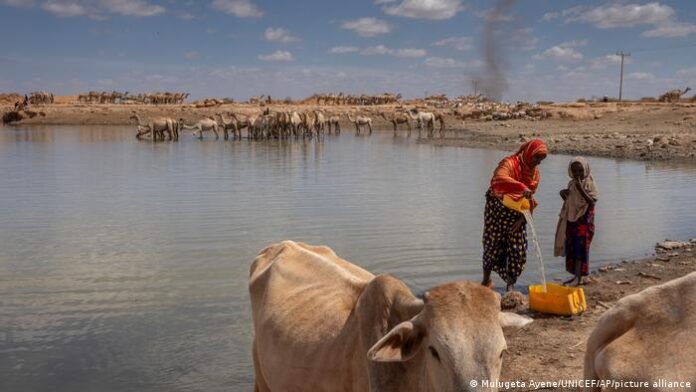Officials say an ongoing drought in the East African country is the worst in a decade. Hundreds of thousands of children could starve if a famine sets in.
Millions in Somalia face a looming famine, the UN said on Tuesday, as the impacts of a prolonged drought continue to bite in the arid East African country.
Somalia is severely drought-prone, but this has been its worst drought in a decade. Neighboring Ethiopia and Kenya have also been hit.
In a joint Tuesday statement by the World Food Program, the UN’s Food and Agriculture Organization (FAO), the humanitarian agency OCHA and UNICEF, officials said growing needs are rapidly outpacing available aid and many affected Somalis have exhausted their ability to cope.
“We are literally about to start taking food from the hungry to feed the starving,” said El-Khidir Daloum, the UN World Food Program’s Somalia representative. “Millions of lives are at stake.”
‘Pockets of famine conditions’
A forecast failure of this year’s April to June rains in east Africa, as well as spiraling food prices and global disruptions to supply chains due to the conflict in Ukraine, have accelerated food shortages, UN officials say, with six Somalia locales likely to see “pockets of famine conditions.”
Around 6 million people — about 40% of the population, face extreme food insecurity, according to a new report by the Integrated Food Security Phase Classification.
Humanitarian agencies warn that children would be the worst hit if famine conditions set in, adding that 1.4 million children face acute malnutrition this year. Around a quarter of them could starve.
Only 4.4% of the $1.5 billion (€1.3 billion) needed to tackle the crisis has been realized, according to the UN statement, as other global emergencies emerge.
A 2011 famine prompted by drought and conflict killed at least 250,000 people in the country.
Global issues contribute to growing food insecurity
Experts say the Ukraine war and aftershocks of the coronavirus pandemic have contributed to soaring commodities and food prices worldwide, hitting poorer, import-dependent countries.
Martin Frick, director of the Germany office of the World Food Program, told DW that sub-Saharan and North African countries, as well as Middle Eastern countries, are the worst hit.
“In simple terms, they just cannot afford anymore to buy the most basic foods,” Frick said, adding that the organization’s operations have also been impacted. “It’s affecting the poorest family that often spends 70-80% of the family income for bread.”
sl/fb (AFP, dpa)






